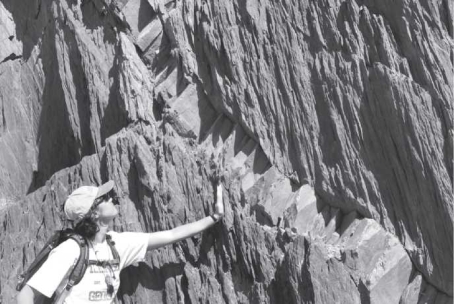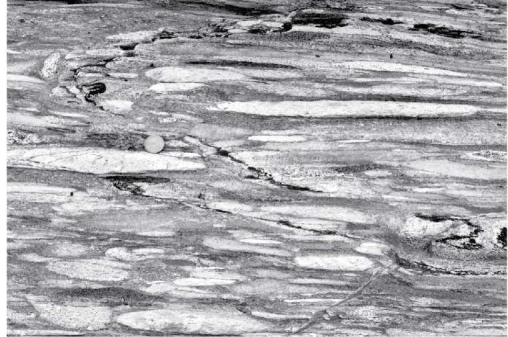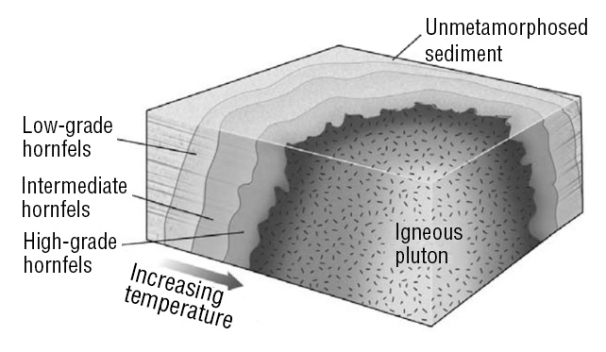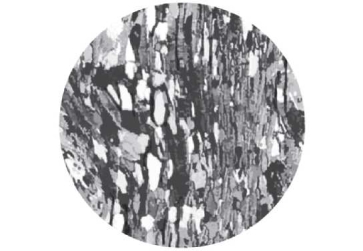Deck 6: A Process of Change: Metamorphism and the Rock Cycle
Question
Question
Question
Question
Question
Question
Question
Question
Question
Question
Question
Question
Question
Question
Question
Question
Question
Question
Question
Question
Question
Question
Question
Question
Question
Question
Question
Question
Question
Question
Question
Question
Question
Question
Question
Question
Question
Question
Question
Question
Question
Question
Question
Question
Question
Question
Question
Question
Question
Question
Question
Question
Question
Question
Question
Question
Question
Question
Question
Question

Unlock Deck
Sign up to unlock the cards in this deck!
Unlock Deck
Unlock Deck
1/60
Play
Full screen (f)
Deck 6: A Process of Change: Metamorphism and the Rock Cycle
1
The image below shows 
A)foliation.
B)migmatite.
C)pressure solution.
D)metasomatism.

A)foliation.
B)migmatite.
C)pressure solution.
D)metasomatism.
A
2
Change that takes place during metamorphism that is associated with hot water solutions (hydrothermal fluids) is termed
A)foliation.
B)metasomatism.
C)anachronism.
D)hydrosomatism
A)foliation.
B)metasomatism.
C)anachronism.
D)hydrosomatism
B
3
Oriented stress during metamorphism will cause crystals to rotate into a preferred orientation unless the crystals are
A)primarily mica.
B)platy.
C)equant.
D)elongate.
A)primarily mica.
B)platy.
C)equant.
D)elongate.
C
4
Preexisting rock that is subsequently altered to form a metamorphic rock is termed a
A)xenolith.
B)source rock.
C)protolith.
D)phenocryst.
A)xenolith.
B)source rock.
C)protolith.
D)phenocryst.

Unlock Deck
Unlock for access to all 60 flashcards in this deck.
Unlock Deck
k this deck
5
Which of the following processes CANNOT occur in the formation of metamorphic rock?
A)the realignment of minerals so that they develop a preferred orientation
B)the segregation of minerals into layers of different compositions
C)the solid-state rearrangement of atoms or ions to create a new assemblage of minerals
D)complete melting of the rock, followed by solidification to form a new rock
A)the realignment of minerals so that they develop a preferred orientation
B)the segregation of minerals into layers of different compositions
C)the solid-state rearrangement of atoms or ions to create a new assemblage of minerals
D)complete melting of the rock, followed by solidification to form a new rock

Unlock Deck
Unlock for access to all 60 flashcards in this deck.
Unlock Deck
k this deck
6
Metamorphism is specific to processes that occur in conditions between _________ and __________.
A)diagenesis; lithification
B)diagenesis; melting
C)magmatism; sedimentation
D)melting; pressure solution
A)diagenesis; lithification
B)diagenesis; melting
C)magmatism; sedimentation
D)melting; pressure solution

Unlock Deck
Unlock for access to all 60 flashcards in this deck.
Unlock Deck
k this deck
7
Mineral assemblages within metamorphic rock are
A)always identical to that found within its protolith.
B)dependent only on the mineral assemblage of its protolith.
C)dependent only on the temperature and pressure of formation.
D)dependent on both the mineral content of its protolith and the temperature and pressure of formation.
A)always identical to that found within its protolith.
B)dependent only on the mineral assemblage of its protolith.
C)dependent only on the temperature and pressure of formation.
D)dependent on both the mineral content of its protolith and the temperature and pressure of formation.

Unlock Deck
Unlock for access to all 60 flashcards in this deck.
Unlock Deck
k this deck
8
Which list properly orders these foliated metamorphic rocks from lowest grade to highest grade?
A)gneiss, slate, schist, and phyllite
B)slate, schist, phyllite, and gneiss
C)slate, phyllite, schist, and gneiss
D)gneiss, phyllite, schist, and slate
A)gneiss, slate, schist, and phyllite
B)slate, schist, phyllite, and gneiss
C)slate, phyllite, schist, and gneiss
D)gneiss, phyllite, schist, and slate

Unlock Deck
Unlock for access to all 60 flashcards in this deck.
Unlock Deck
k this deck
9
The figure below shows the application of 
A)tension.
B)pressure.
C)tensional stress.
D)shear stress.

A)tension.
B)pressure.
C)tensional stress.
D)shear stress.

Unlock Deck
Unlock for access to all 60 flashcards in this deck.
Unlock Deck
k this deck
10
Broadly, metamorphism involves
A)the settling of crystals in a melt as it cools.
B)the sorting of grains by size, as accomplished by rivers and beach waves.
C)the cementation of loose grains and the precipitation of new minerals into pore spaces.
D)changes in mineralogy and texture in response to heat and stress.
A)the settling of crystals in a melt as it cools.
B)the sorting of grains by size, as accomplished by rivers and beach waves.
C)the cementation of loose grains and the precipitation of new minerals into pore spaces.
D)changes in mineralogy and texture in response to heat and stress.

Unlock Deck
Unlock for access to all 60 flashcards in this deck.
Unlock Deck
k this deck
11
The application of ____________ during metamorphism causes elongated crystals to align parallel with each other. When this happens, the rock develops __________________.
A)pressure; a homogeneous texture
B)differential stress; foliation
C)high temperatures; foliation
D)uniform stress; foliation
A)pressure; a homogeneous texture
B)differential stress; foliation
C)high temperatures; foliation
D)uniform stress; foliation

Unlock Deck
Unlock for access to all 60 flashcards in this deck.
Unlock Deck
k this deck
12
A buried body of shale is subjected to differential stress, causing clay minerals to realign and produce slate. This is an example of
A)diagenesis.
B)erosion.
C)metamorphism
D)weathering.
A)diagenesis.
B)erosion.
C)metamorphism
D)weathering.

Unlock Deck
Unlock for access to all 60 flashcards in this deck.
Unlock Deck
k this deck
13
Which of the following is a common protolith involved in the formation of slate?
A)limestone
B)sandstone
C)shale
D)basalt
A)limestone
B)sandstone
C)shale
D)basalt

Unlock Deck
Unlock for access to all 60 flashcards in this deck.
Unlock Deck
k this deck
14
Clay minerals within a buried body of slate are recrystallized at high temperatures and pressures to form mica, producing a rock called phyllite. This is an example of
A)diagenesis.
B)erosion.
C)metamorphism
D)weathering.
A)diagenesis.
B)erosion.
C)metamorphism
D)weathering.

Unlock Deck
Unlock for access to all 60 flashcards in this deck.
Unlock Deck
k this deck
15
Spreading peanut butter on bread is an application of
A)compressive stress.
B)pressure.
C)shear stress.
D)metasomatism.
A)compressive stress.
B)pressure.
C)shear stress.
D)metasomatism.

Unlock Deck
Unlock for access to all 60 flashcards in this deck.
Unlock Deck
k this deck
16
Foliation may include the alignment of __________ in a metamorphic rock
A)minerals
B)Strata
C)fossils
D)facies
A)minerals
B)Strata
C)fossils
D)facies

Unlock Deck
Unlock for access to all 60 flashcards in this deck.
Unlock Deck
k this deck
17
Clay minerals within a slate are changed into mica minerals as a result of the application of heat to a rock. This is an example of
A)pressure solution.
B)recrystallization.
C)plastic deformation.
D)phase change.
A)pressure solution.
B)recrystallization.
C)plastic deformation.
D)phase change.

Unlock Deck
Unlock for access to all 60 flashcards in this deck.
Unlock Deck
k this deck
18
Which of the following processes is NOT involved in metamorphism?
A)contact with a hot pluton
B)contact with hydrothermal fluids
C)heat and pressure associated with deep burial
D)cementation and compaction of grains during diagenesis
A)contact with a hot pluton
B)contact with hydrothermal fluids
C)heat and pressure associated with deep burial
D)cementation and compaction of grains during diagenesis

Unlock Deck
Unlock for access to all 60 flashcards in this deck.
Unlock Deck
k this deck
19
Which of the following is a common protolith involved in the formation of quartzite?
A)limestone
B)sandstone
C)shale
D)slate
A)limestone
B)sandstone
C)shale
D)slate

Unlock Deck
Unlock for access to all 60 flashcards in this deck.
Unlock Deck
k this deck
20
The blueschist facies is a metamorphic realm of
A)high temperature and pressure.
B)low temperature and pressure.
C)high temperature but relatively low pressure.
D)high pressure but relatively low temperature.
A)high temperature and pressure.
B)low temperature and pressure.
C)high temperature but relatively low pressure.
D)high pressure but relatively low temperature.

Unlock Deck
Unlock for access to all 60 flashcards in this deck.
Unlock Deck
k this deck
21
A type of foliation defined by the preferred orientation of large crystals of mica is termed
A)slaty cleavage.
B)phyllitic luster.
C)schistosity.
D)compositional banding
A)slaty cleavage.
B)phyllitic luster.
C)schistosity.
D)compositional banding

Unlock Deck
Unlock for access to all 60 flashcards in this deck.
Unlock Deck
k this deck
22
Which of the following commonly serves as a protolith in the formation of marble?
A)limestone
B)sandstone
C)shale
D)gneiss
A)limestone
B)sandstone
C)shale
D)gneiss

Unlock Deck
Unlock for access to all 60 flashcards in this deck.
Unlock Deck
k this deck
23
What was the direction of compression that formed the foliation in the image below? 
A)top and bottom, pressing inward
B)both sides, pressing inward
C)top and bottom, pulling outward
D)in and out of the image, pulling outward

A)top and bottom, pressing inward
B)both sides, pressing inward
C)top and bottom, pulling outward
D)in and out of the image, pulling outward

Unlock Deck
Unlock for access to all 60 flashcards in this deck.
Unlock Deck
k this deck
24
Regional metamorphism
A)takes place at low temperatures and low pressure.
B)takes place only along continental margins.
C)is another name for thermal metamorphism.
D)is another name for dynamothermal metamorphism.
A)takes place at low temperatures and low pressure.
B)takes place only along continental margins.
C)is another name for thermal metamorphism.
D)is another name for dynamothermal metamorphism.

Unlock Deck
Unlock for access to all 60 flashcards in this deck.
Unlock Deck
k this deck
25
In the formation of gneiss (from a granite protolith), distinctive compositional bands form because of
A)crystals migrating within the rock.
B)crystals dissolving, with atoms and ions migrating and reorganizing as new crystals.
C)crystals melting, with new crystals solidifying in color bands.
D)chemical reactions with groundwater.
A)crystals migrating within the rock.
B)crystals dissolving, with atoms and ions migrating and reorganizing as new crystals.
C)crystals melting, with new crystals solidifying in color bands.
D)chemical reactions with groundwater.

Unlock Deck
Unlock for access to all 60 flashcards in this deck.
Unlock Deck
k this deck
26
Thermal (contact) metamorphism produces
A)foliated rocks only.
B)nonfoliated rocks only.
C)both foliated and nonfoliated rocks.
D)Thermal metamorphism is not capable of producing metamorphic rocks.
A)foliated rocks only.
B)nonfoliated rocks only.
C)both foliated and nonfoliated rocks.
D)Thermal metamorphism is not capable of producing metamorphic rocks.

Unlock Deck
Unlock for access to all 60 flashcards in this deck.
Unlock Deck
k this deck
27
The rapid, deep burial of sediments in an accretionary prism leads to the formation of a metamorphic rock called
A)blueschist.
B)greenschist.
C)migmatite.
D)gneiss.
A)blueschist.
B)greenschist.
C)migmatite.
D)gneiss.

Unlock Deck
Unlock for access to all 60 flashcards in this deck.
Unlock Deck
k this deck
28
Consult the figure below. The region of thermally metamorphosed rock surrounding a cooled pluton is called a(n) 
A)shear zone.
B)aureole.
C)chilled margin.
D)metamorphic ring.

A)shear zone.
B)aureole.
C)chilled margin.
D)metamorphic ring.

Unlock Deck
Unlock for access to all 60 flashcards in this deck.
Unlock Deck
k this deck
29
Mylonites, formed from dynamic metamorphism, typically do NOT display
A)foliation roughly parallel to a fault.
B)very fine grains.
C)shear zones.
D)bands of randomly oriented mica grains.
A)foliation roughly parallel to a fault.
B)very fine grains.
C)shear zones.
D)bands of randomly oriented mica grains.

Unlock Deck
Unlock for access to all 60 flashcards in this deck.
Unlock Deck
k this deck
30
Foliated metamorphic rocks possess
A)leafy plant fossils (ancient foliage).
B)a homogeneous texture resulting from randomly oriented grains.
C)mineral grains in preferred orientations or patterns of association such as banding.
D)minerals precipitated directly from seawater.
A)leafy plant fossils (ancient foliage).
B)a homogeneous texture resulting from randomly oriented grains.
C)mineral grains in preferred orientations or patterns of association such as banding.
D)minerals precipitated directly from seawater.

Unlock Deck
Unlock for access to all 60 flashcards in this deck.
Unlock Deck
k this deck
31
Elongated or "smeared" mineral grains indicate that a rock was subjected to
A)shearing.
B)compression.
C)tension.
D)Pressure solution.
A)shearing.
B)compression.
C)tension.
D)Pressure solution.

Unlock Deck
Unlock for access to all 60 flashcards in this deck.
Unlock Deck
k this deck
32
Hornfels forms as a result of ____________ metamorphism.
A)dynamothermal
B)hydrothermal
C)dynamic
D)thermal
A)dynamothermal
B)hydrothermal
C)dynamic
D)thermal

Unlock Deck
Unlock for access to all 60 flashcards in this deck.
Unlock Deck
k this deck
33
Slaty cleavage, schistosity, and compositional banding are all examples of
A)mineral cleavage.
B)foliation.
C)recrystallization.
D)metamorphic facies.
A)mineral cleavage.
B)foliation.
C)recrystallization.
D)metamorphic facies.

Unlock Deck
Unlock for access to all 60 flashcards in this deck.
Unlock Deck
k this deck
34
Within a single mountain range,
A)only low-grade metamorphic rocks are likely to be found.
B)only high-grade metamorphic rocks are likely to be found.
C)only nonfoliated metamorphic rocks are likely to be found.
D)it is possible to find a variety of metamorphic rocks produced in distinct facies, including high-, intermediate-, and low-grade rocks.
A)only low-grade metamorphic rocks are likely to be found.
B)only high-grade metamorphic rocks are likely to be found.
C)only nonfoliated metamorphic rocks are likely to be found.
D)it is possible to find a variety of metamorphic rocks produced in distinct facies, including high-, intermediate-, and low-grade rocks.

Unlock Deck
Unlock for access to all 60 flashcards in this deck.
Unlock Deck
k this deck
35
Dynamothermal (regional) metamorphism occurs when
A)rock becomes deeply buried during continental collision and mountain building.
B)regression of the sea leads to erosion of sedimentary cover on a body of rock.
C)the upper surface of a body of rock develops a thick soil profile.
D)a pluton causes metamorphism in a small surrounding region.
A)rock becomes deeply buried during continental collision and mountain building.
B)regression of the sea leads to erosion of sedimentary cover on a body of rock.
C)the upper surface of a body of rock develops a thick soil profile.
D)a pluton causes metamorphism in a small surrounding region.

Unlock Deck
Unlock for access to all 60 flashcards in this deck.
Unlock Deck
k this deck
36
Heating up a rock causes the atoms in the rock to vibrate and break their bonds. The atoms can then move slightly and create new bonds with nearby atoms. This process is called
A)preferred orientation.
B)solid-state diffusion.
C)plastic deformation.
D)melting.
A)preferred orientation.
B)solid-state diffusion.
C)plastic deformation.
D)melting.

Unlock Deck
Unlock for access to all 60 flashcards in this deck.
Unlock Deck
k this deck
37
Thermal (contact) metamorphism occurs
A)in areas surrounding igneous intrusions.
B)only where gneiss is in contact with schist.
C)as a consequence of the sinking of a large geologic terrane to great depth.
D)only at the surface, where rock is in contact with the atmosphere.
A)in areas surrounding igneous intrusions.
B)only where gneiss is in contact with schist.
C)as a consequence of the sinking of a large geologic terrane to great depth.
D)only at the surface, where rock is in contact with the atmosphere.

Unlock Deck
Unlock for access to all 60 flashcards in this deck.
Unlock Deck
k this deck
38
Marble and quartzite are nonfoliated rocks because
A)they are never found beneath fault zones or collisional mountain ranges.
B)both are dominated by minerals that produce equant grains.
C)both are dominated by minerals with crystalline structures that cannot be dissolved.
D)dynamothermal metamorphism can break down the structures of their constituent minerals, but neither of these minerals is stable in that metamorphic environment.
A)they are never found beneath fault zones or collisional mountain ranges.
B)both are dominated by minerals that produce equant grains.
C)both are dominated by minerals with crystalline structures that cannot be dissolved.
D)dynamothermal metamorphism can break down the structures of their constituent minerals, but neither of these minerals is stable in that metamorphic environment.

Unlock Deck
Unlock for access to all 60 flashcards in this deck.
Unlock Deck
k this deck
39
Rocks subjected to __________ feel a squeezing motion.
A)metasomatism
B)diagenesis
C)compression
D)extension
A)metasomatism
B)diagenesis
C)compression
D)extension

Unlock Deck
Unlock for access to all 60 flashcards in this deck.
Unlock Deck
k this deck
40
What type of metamorphism affects the greatest volumes of rock and produces the greatest variety in metamorphic rock types?
A)thermal
B)dynamothermal
C)dynamic
D)shock
A)thermal
B)dynamothermal
C)dynamic
D)shock

Unlock Deck
Unlock for access to all 60 flashcards in this deck.
Unlock Deck
k this deck
41
Geologists classify metamorphic rocks primarily according to
A)whether they are foliated or nonfoliated.
B)whether they contain pseudomorphs.
C)the percentage of silica.
D)the size of their crystals
A)whether they are foliated or nonfoliated.
B)whether they contain pseudomorphs.
C)the percentage of silica.
D)the size of their crystals

Unlock Deck
Unlock for access to all 60 flashcards in this deck.
Unlock Deck
k this deck
42
Draw the orientation of the preferential stress that created the foliation in the image below.



Unlock Deck
Unlock for access to all 60 flashcards in this deck.
Unlock Deck
k this deck
43
What is a primary difference between phyllite and schist?
A)Schist contains mica, whereas phyllite contains only clay.
B)Phyllite contains mica, whereas schist contains only clay.
C)Mica crystals within schist are larger than those within phyllite.
D)Mica crystals within phyllite are larger than those within schist.
A)Schist contains mica, whereas phyllite contains only clay.
B)Phyllite contains mica, whereas schist contains only clay.
C)Mica crystals within schist are larger than those within phyllite.
D)Mica crystals within phyllite are larger than those within schist.

Unlock Deck
Unlock for access to all 60 flashcards in this deck.
Unlock Deck
k this deck
44
What metamorphic facies would most commonly be associated with a subduction zone and why?

Unlock Deck
Unlock for access to all 60 flashcards in this deck.
Unlock Deck
k this deck
45
What is the difference between schist and phyllite?

Unlock Deck
Unlock for access to all 60 flashcards in this deck.
Unlock Deck
k this deck
46
What is an index mineral? What do metamorphic isograds indicate? What is a metamorphic zone?

Unlock Deck
Unlock for access to all 60 flashcards in this deck.
Unlock Deck
k this deck
47
Describe how the rock cycle is linked to plate tectonics.

Unlock Deck
Unlock for access to all 60 flashcards in this deck.
Unlock Deck
k this deck
48
Which of the following processes is NOT involved directly with the creation of foliation?
A)recrystallization
B)preferential stress
C)compression
D)shear stress
A)recrystallization
B)preferential stress
C)compression
D)shear stress

Unlock Deck
Unlock for access to all 60 flashcards in this deck.
Unlock Deck
k this deck
49
Which of the following is a common foliated metamorphic rock?
A)marble
B)gneiss
C)hornfels
D)diorite
A)marble
B)gneiss
C)hornfels
D)diorite

Unlock Deck
Unlock for access to all 60 flashcards in this deck.
Unlock Deck
k this deck
50
Describe the resulting metamorphism that occurs next to an igneous intrusion.

Unlock Deck
Unlock for access to all 60 flashcards in this deck.
Unlock Deck
k this deck
51
During dynamothermal metamorphism, several metamorphic processes are at work. Describe these processes and what effect they might have on the rocks subjected to this type of metamorphism.

Unlock Deck
Unlock for access to all 60 flashcards in this deck.
Unlock Deck
k this deck
52
Metamorphism includes a solid-state change in a rock caused by heat, pressure, and/or hydrothermal fluids. Explain what is meant by solid-state change.

Unlock Deck
Unlock for access to all 60 flashcards in this deck.
Unlock Deck
k this deck
53
Why are there so few Precambrian-age rocks found on Earth?

Unlock Deck
Unlock for access to all 60 flashcards in this deck.
Unlock Deck
k this deck
54
Foliated rock is created by a preferential stress oriented ____________ the foliation.
A)the same way as
B)diagonally to
C)perpendicular to
D)parallel to
A)the same way as
B)diagonally to
C)perpendicular to
D)parallel to

Unlock Deck
Unlock for access to all 60 flashcards in this deck.
Unlock Deck
k this deck
55
Which of the following is a high-grade metamorphic rock?
A)quartzite
B)slate
C)gneiss
D)schist
A)quartzite
B)slate
C)gneiss
D)schist

Unlock Deck
Unlock for access to all 60 flashcards in this deck.
Unlock Deck
k this deck
56
Nonfoliated metamorphic rocks are mainly classified based on their
A)Metamorphic texture.
B)mineral composition.
C)percentage of preferred orientation.
D)proximity to the metamorphic source.
A)Metamorphic texture.
B)mineral composition.
C)percentage of preferred orientation.
D)proximity to the metamorphic source.

Unlock Deck
Unlock for access to all 60 flashcards in this deck.
Unlock Deck
k this deck
57
Two common metamorphic rocks that typically lack foliation are _________ and _________.
A)slate; phyllite
B)gneiss; migmatite
C)quartzite; marble
D)schist; metaconglomerate
A)slate; phyllite
B)gneiss; migmatite
C)quartzite; marble
D)schist; metaconglomerate

Unlock Deck
Unlock for access to all 60 flashcards in this deck.
Unlock Deck
k this deck
58
Metamorphic grade describes the intensity or degree of metamorphism. The metamorphic grade of a rock is determined mainly by the temperature and amount of recrystallization or neocrystallization to which a rock is subjected. List the following rocks in order from low-grade to high-grade metamorphic rocks, then describe the changes seen in the suite of rocks as the grade is increased: gneiss, slate, schist, phyllite, and migmatite.

Unlock Deck
Unlock for access to all 60 flashcards in this deck.
Unlock Deck
k this deck
59
The progressive transformations that result in the passage of atoms through different rock types over geologic time is called the ___________ cycle.
A)Milankovitch
B)rock
C)cyclothem
D)carbon
A)Milankovitch
B)rock
C)cyclothem
D)carbon

Unlock Deck
Unlock for access to all 60 flashcards in this deck.
Unlock Deck
k this deck
60
A nonfoliated metamorphic rock that is composed entirely of calcite is called
A)hornfels.
B)slate.
C)quartzite.
D)marble.
A)hornfels.
B)slate.
C)quartzite.
D)marble.

Unlock Deck
Unlock for access to all 60 flashcards in this deck.
Unlock Deck
k this deck


